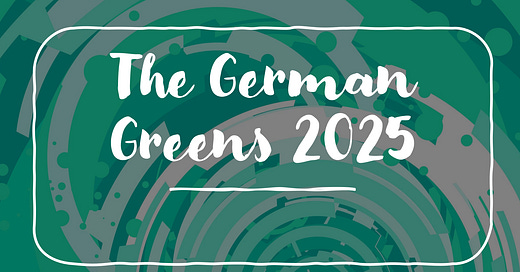To talk about the German Greens is to talk about paradox. A party born from the fervour of grassroots protest—anti-nuclear marches, feminist collectives, pacifist encampments— the Greens have transformed from a fringe group of activists into a formidable political force. Today they are part of the establishment, their accent mirroring the world’s growing climate anxieties. In the rigid mechanisms of parliamentary politics, they have found themselves a bit lost, caught between their activist origins and the compromises of governance.
Here is a party that once stormed the Bundestag in 1983 with flowers in its hair, only to exit the stage four decades later, with its bold ideas dulled into policy briefs. The 2025 election results—11.6% of the vote, a three-point drop from 2021——read less like a defeat than a quiet farewell to a certain kind of idealism. And yet, political obituaries are always premature. The real story is messier.
The Origins: A Party Built on Protest
The Greens were never just a party; they were a reaction. The late 1970s had been a season of dissatisfaction: the New Left’s dreams lay in fragments, the oil crisis exposed capitalism’s fragility, and the German’s embrace of nuclear energy seemed to many as a Faustian bargain. Enter the Greens: a chaotic but electric mix of pacifists, feminists, anti-industrialists, and even deep-green conservatives, all united by a single idea: there had to be another way.
Their manifesto, written in Karlsruhe in 1980, was as radical in tone as in substance. It rejected not only nuclear power, and mass consumption as a societal choice, but the very logic of industrial modernity. Their slogan, “We are neither left nor right—we are ahead.” (Nicht Rechts, nicht Links, sondern Vorn), captured the party’s ambition.
Yet, from the start, there was a tension: Should the Greens be idealists, or should they seek real power? The battle between the Fundis (fundamentalists, who wanted to stay radical) and Realos (realists, who saw compromise as the price of influence) would shape the party’s trajectory for decades. By the late 1990s, the Realos had won. In the 1998 Schröder coalition, Joschka Fischer, the Greens’ leather-jacketed foreign minister, became the unlikely face of German military intervention in Kosovo, trading peacenik slogans for NATO airstrikes. The irony was hard to miss.
By the 2000s, climate policy, once the Greens’ exclusive terrain, became a consensus project. Even Angela Merkel’s conservatives adopted emissions targets. In many ways, the party had succeeded too well: the ideas they once championed had become mainstream, making them seem less like revolutionaries and more like bureaucrats.
The 2025 Elections
Fast forward to today. By 2025, climate politics was no longer the Greens’ monopoly. Climate action wasn’t radical anymore—it was just governance.
And yet, the Greens weren’t the ones reaping the rewards.
The far-right Alternative for Germany (AfD), with a chilling 20.8% of the vote, accused the Greens of imposing an “eco-dictatorship.” Even mainstream conservatives weaponised this sentiment. A day before the election, CDU leader Friedrich Merz said that he would govern “for the majority who can think straight, and who also have all their marbles … and not for any green and leftwing nutcases”. Merz later said he was referring specifically to anti-rightwing protesters-—but the damage was done.
Had the left-populist Sahra Wagenknecht Alliance (BSW) crossed the 5% electoral threshold—it missed by a mere 0.03%—the Greens might have retained their kingmaker status. Instead, they found themselves squeezed from all sides - their influence diminished.
The Final Paradox
But here’s the twist: maybe the Greens didn’t lose at all. Because even as their vote share fell, their ideas won. Merz, despite his pro-nuclear rhetoric, cannot unwind Germany’s green energy transition (Energiewende); the SPD remains committed to the climate policies forged under Olaf Scholz. Even the AfD, despite its nationalist boldness, does not dare openly deny the reality of climate change. What the Greens mistook for failure is perhaps their final triumph: the normalisation of the climate crisis.
But normalisation comes at a cost. When Green leader Annalena Baerbock condemned Putin’s invasion of Ukraine as a pivotal moment, she unknowingly echoed her predecessors’ calls to “resist the machinery of death” in the 1980s. The language endured - the speaker had not. The party’s pacifist roots now seemed a distant past, buried beneath expedient alliances and the dull arithmetic of coalition-building.
There is a photograph from 1983: newly elected Green MPs unfurl a banner in the Bundestag reading “DIE GRÜNEN – DIE ANDERE POLITIK” (“The Greens – The Other Politics”). Four decades later, the “other” has been assimilated.
Robert Habeck, ever the melancholic realist, understood this before most. His decision to step down from party leadership was not a retreat but an admission. The revolution has been institutionalised. The urgency was replaced by policy memos. And so, the party that once thrived on being different now finds itself… ordinary. A victim of its own success.
The climate crisis marches on, but the party that once gave it voice now wanders the political wilderness, its once-radical demands reduced to hashtags and policy memos.
The Greens did not fail. They changed the world so much … that we no longer notice them. And that is the final paradox.
This article is free to read, but if you found it useful, please consider subscribing or making a small donation at my Buy Me A Coffee page below. The Climate Historian is an independent publication, entirely supported by readers like you.
Notes:
Germany’s Greens. Retrieved from World Socialist Web Site (WSWS): https://www.wsws.org/en/articles/2022/03/10/paci-m10.html
SÉBASTIEN, M., & ALICE, S. (2021). WHAT ARE THE AMBITIONS OF THE. Retrieved from https://institutdelors.eu/wp-content/uploads/dlm_uploads/2021/08/PB_210908_What-are-the-ambitions-of-the-German-Green-party_Maillard_EN.pdf
GERMANY’S NEW CENTRISTS? The evolution, political prospects, and foreign policy of Germany’s Green Party FP_20201020_germanys_new_centrists_sloat.pdf.pdf
German election shows how far green wave has receded in Europe
Opening speech by Foreign Minister Annalena Baerbock at the Western Balkans Conference in Berlin - Federal Foreign Office







Share this post